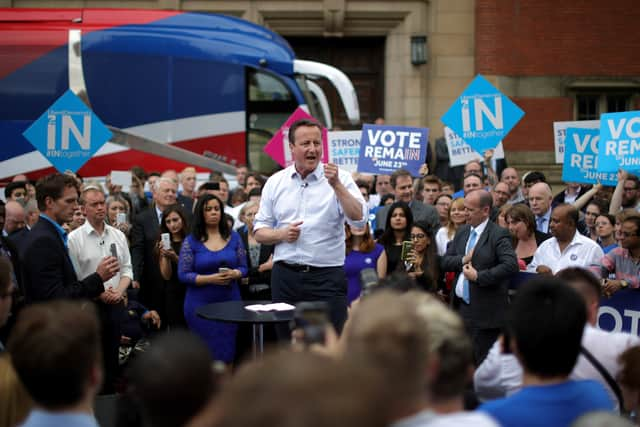Liz Truss wanted to reward the 1%. Now it’s the 99% who will pay for her mistakes


The question of when Liz Truss will relinquish her increasingly weak grip on power is no longer of much interest. Her immediate future will generate plenty of headlines in the coming days and weeks, but instead, we should ask how it’s come to this. How did we get lumbered with such woeful, criminally-clueless political leaders?
Before we consider that question, remember this: none of the Conservative MPs, and few of the 81,326 party members who voted for Truss in that mind-numbing leadership contest, will be seriously affected by the economic damage she’s inflicted on the UK. The parliamentarians who sit behind her earn a basic salary of £84,144, and as we found in our Part Time Parliament investigation last year, Tory MPs were more likely to have lucrative ‘second jobs’ to top up a wage that one of them, Peter Bottomley, memorably described as “really grim” (back when it was a paltry £81k).
Advertisement
Hide AdAdvertisement
Hide AdAs prime minister (for now) Truss is entitled to earn £161,401. She has an estimated net worth of £8.4 million from her previous jobs at Shell and at Cable & Wireless, her published books (one of which, rather perfectly, was titled Britannia Unchained: Global Lessons for Growth and Prosperity) and her property in Norfolk and London.
Then you have her short-lived former Chancellor, Kwasi Kwarteng. For helping his old friend Truss design the kamikaze mini-budget he was entitled to £71,673 on top of his MP’s salary, so could have earned £155,817 pro rata for the 38 days he was in post. His pre-political background was in the City at JPMorgan Chase and the hedge fund Odey Asset Management, which recently made returns of almost 200% by betting against government bonds following the mini-budget.
As we reported this week, Truss will be entitled to claim up to £115,000 per year from the taxpayer for the rest of her life once she leaves office. Kwarteng, meanwhile, could have claimed a quarter of his annual ministerial salary - almost £18,000 - as a one-off sweetener for being given the boot.


That’s them, what about the rest of us? The median average salary for full-time workers in the UK is £31,285, or £25,971 if you include part-time workers. And while ex-PM Boris Johnson recently registered The Office Of Boris Johnson on Companies House, it’s safe to say that most people outside the Westminster bubble cannot call upon property portfolios, company directorships, book deals or speaking tours to help them through the cost of living crisis.
Advertisement
Hide AdAdvertisement
Hide AdYet we’re all about to get materially poorer, because of this government. Mortgage rates have risen as a direct result of the mini-budget, which will affect borrowers, those looking to get on to the property ladder, and renters, as landlords inevitably hike monthly payments. Some pension funds were only saved by the Bank of England’s costly intervention, and the economic chaos wrought by Truss and Kwarteng has also bounced the government, now ostensibly led by Jeremy Hunt, back towards a new era of austerity.
There’s now little to no chance of benefits being uprated in line with inflation, and severe cuts to public services are on the cards, as the new Chancellor demands cost savings from every government department. In the last period of austerity, under David Cameron and George Osborne, a study by the Institute for Public Policy Research (IPPR) found that there had been more than 130,000 avoidable deaths in the UK, due to the impact of cuts on public health budgets. It’s not just about our ability to pay the bills - further austerity will have an impact on our health and wellbeing too.
The much-heralded energy price guarantee has been hacked away, and will now end in April rather than in two years’ time. On top of all this, inflation is expected to hit 10% again tomorrow, running far ahead of wage increases. We could go on.
But let’s return to the original question of how we got to this point. How could we have such morally suspect, economically illiterate people in charge of the country’s finances? One plausible theory is that it all stems from internal Tory politics, and is a tale we’re all-too-familiar with. Cameron had to appease the hard-right of his party, so he called the 2016 Brexit referendum. He lost, quit, then went to write a book in his £25,000 garden shed. Then we got Theresa May, whose authority soon turned to dust as she too succumbed to the hard-right wing of the party. Next we got the Brexiteers’ hero, the archetypal opportunist that was Boris Johnson. We all know how that turned out.


Advertisement
Hide AdAdvertisement
Hide AdJohnson’s endless scandals led to the Tory leadership contest this past summer. Had it not been for former leader William Hague changing the rules back in the late 90s, it would have just been MPs deciding, rather than party activists, which would have likely delivered Rishi Sunak the keys to Number 10. Instead, the members were wooed by Truss’ fable of a low-tax, high-growth utopia - despite Sunak himself clearly warning of the threat of rocketing interest rates.
Truss clearly wanted to reward the 1%, adhering to the widely discredited theory of trickle-down economics . Now it’s the 99% who will be forced to suffer. Her political career is effectively over, but she’s leaving one hell of a mess to clear up. Labour’s popularity has surged almost by dint of not being the Tories, but they’ve been caught out by the government’s extreme hand-brake turn, after they too had previously called for the 1p income tax cut that Hunt has now abandoned.
The UK government had been taken over by the free-market ideology of Truss in recent months, and the country ironically now finds itself at the mercy of the very markets she claimed would deliver growth. Regardless of what happens with elections or leadership coups, it’s going to be mightily difficult for any government to chart a path out of this omnishambles, as Malcolm Tucker would surely call it.
The one thing we know for sure is that, at the very least, we need basic competency and compassion from those we elect to public office. We once took those qualities for granted when we stepped into the polling booth and cast our votes. Whenever we do get the next election, the current crop of politicians will have to work overtime to regain that trust - if their second jobs allow it.
Comment Guidelines
National World encourages reader discussion on our stories. User feedback, insights and back-and-forth exchanges add a rich layer of context to reporting. Please review our Community Guidelines before commenting.
